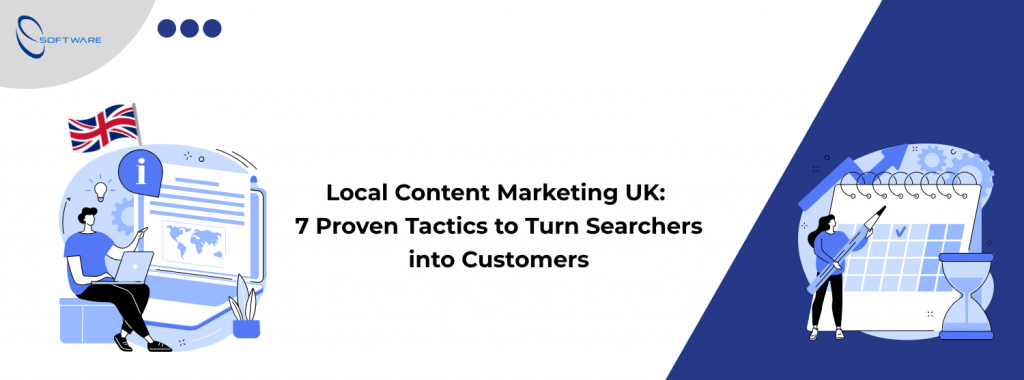Why Local Content Marketing Is the Missing Link for UK Businesses
Here’s the uncomfortable truth: 61% of UK SMEs invest in local SEO but produce zero location-specific content. They’ve claimed their Google Business Profile, built citations, and chased reviews, yet wonder why conversions remain anaemic.
The missing link? Local content marketing.
SEO gets you visible. Content converts that visibility into calls, bookings, and revenue. Without strategic local content marketing, you’re driving traffic to a digital shopfront with no salesperson inside.
Most local businesses publish generic blogs that could apply to any city, any country. “10 Tips for Choosing a Plumber” says nothing about why a Manchester homeowner should choose your plumbing business over the competitor three streets away.
No location relevance. No community connection. No compelling CTAs. Just content for content’s sake that generates clicks but zero commercial outcomes.
S Software Ltd helps ambitious UK businesses bridge this gap with strategic local SEO services in the UK that combine technical optimisation with conversion-focused content. This isn’t theory, it’s your step-by-step playbook for turning local searchers into loyal customers.
Table of Contents
What Is Local Content Marketing?
Local content marketing is the strategic creation and distribution of location-specific content designed to attract, engage, and convert customers within your geographic service area.
It’s not about national SEO targeting broad keywords. It’s about dominating “near me” searches, capturing geo-qualified traffic, and speaking directly to the communities you serve. Location-specific content signals relevance to Google, improves visibility in Maps and Local Pack results, and builds customer trust through demonstrated community knowledge. When your content speaks directly to neighbourhood challenges and local concerns, it transforms you from just another service provider into the obvious local choice.
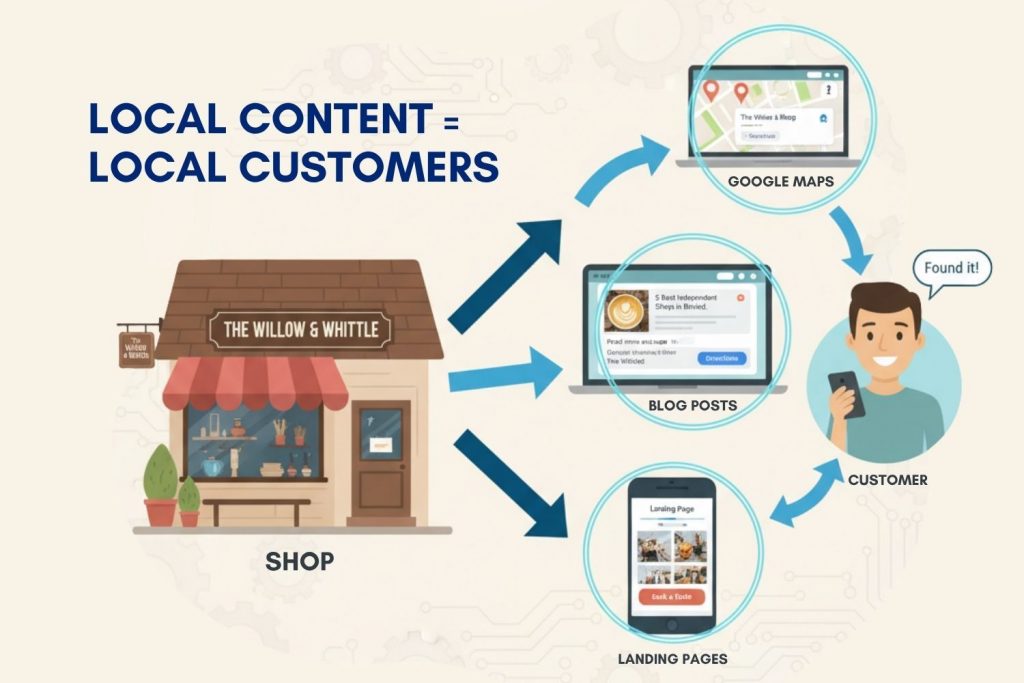
Real-World UK Examples That Prove Impact
A Manchester heating engineer created neighbourhood-specific guides: “Boiler Installation Costs in Didsbury,” “Emergency Heating Repairs in Salford,” “Central Heating Upgrades for Victorian Homes in Chorlton.” Within five months, organic traffic from Manchester suburbs increased 340%. Inbound call volume doubled. Average job value rose 22% because of content pre-qualified leads.
A Birmingham solicitor published quarterly legal updates addressing West Midlands-specific property law changes. This attracted backlinks from local news sites, positioned the firm as the regional authority, and generated 18 high-value client inquiries directly attributed to content discovery.
A Leeds café documented their journey sourcing Yorkshire ingredients, profiled local suppliers, and created event guides around the Leeds cultural calendar. Instagram engagement tripled. Weekend bookings increased 89%. They became the “community café” rather than just another coffee shop.
Content marketing for local businesses transforms commoditised services into community institutions that customers choose emotionally, not just transactionally.
Source: HubSpot’s comprehensive Content Marketing Guide provides foundational frameworks applicable across industries and geographies.
Tactic 1: Local Keyword Research That Matches Searcher Intent
Generic keyword research fails local businesses because it misses the micro-intent signals that drive actual conversions.”Plumber” has 22,000 monthly UK searches but zero commercial value to a Manchester tradesperson. “Emergency plumber Manchester M20” has 40 monthly searches, but represents someone with a burst pipe needing immediate help, infinitely more valuable.
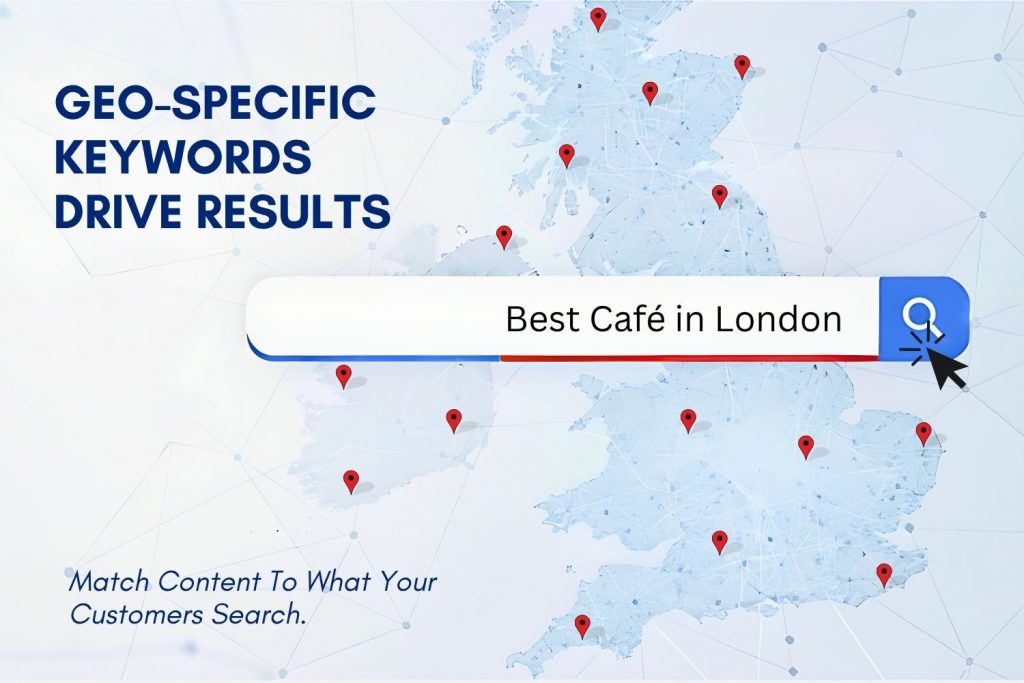
How to Find Geo-Specific Keywords
Google Keyword Planner reveals search volume for location modifiers. Search “plumber” then filter by Manchester postcode areas (M1, M20, M21, etc.). You’ll discover which neighbourhoods generate the most searches.
Google Search Console shows which geo-queries already trigger your website. Navigate to Performance > Search Results > filter by queries containing your city name. Sort by impressions to find high-volume terms you’re not yet ranking for.
Google Maps autocomplete reveals real searcher behaviour. Type your service + city into Google Maps search. The autocomplete suggestions show exactly what local customers search for.
Tools like SEMrush and Ahrefs offer advanced local keyword analysis, but Google’s free tools provide the essential data most SMEs need to start.
Balancing “Near Me” vs. Explicit Location Searches
“Plumber near me” captures mobile users with immediate intent but fierce competition. These searchers are often comparing multiple options.
“Plumber in Manchester city centre” targets users in the research phase, with slightly lower urgency but higher consideration. They’re building shortlists.
“Emergency plumber Didsbury 24 hour” represents crisis-mode searchers with maximum intent. They’ll call the first credible business they find.
Strategic approach: Create content targeting all three intent stages. Service pages for explicit locations, blog content for “near me” education, and dedicated emergency pages for crisis searches.
For the technical implementation of location keywords across your site architecture, our optimising on-page SEO for local keywords service ensures every page is precision-targeted.
Tactic 2: Creating Location Landing Pages That Actually Convert
Generic service pages are conversion killers. “We serve the Greater Manchester area” tells customers nothing about why you understand their specific neighbourhood challenges. Location landing pages are dedicated pages optimised for individual cities, towns, or even neighbourhoods within your service area. They’re the foundation of scalable content for local SEO.
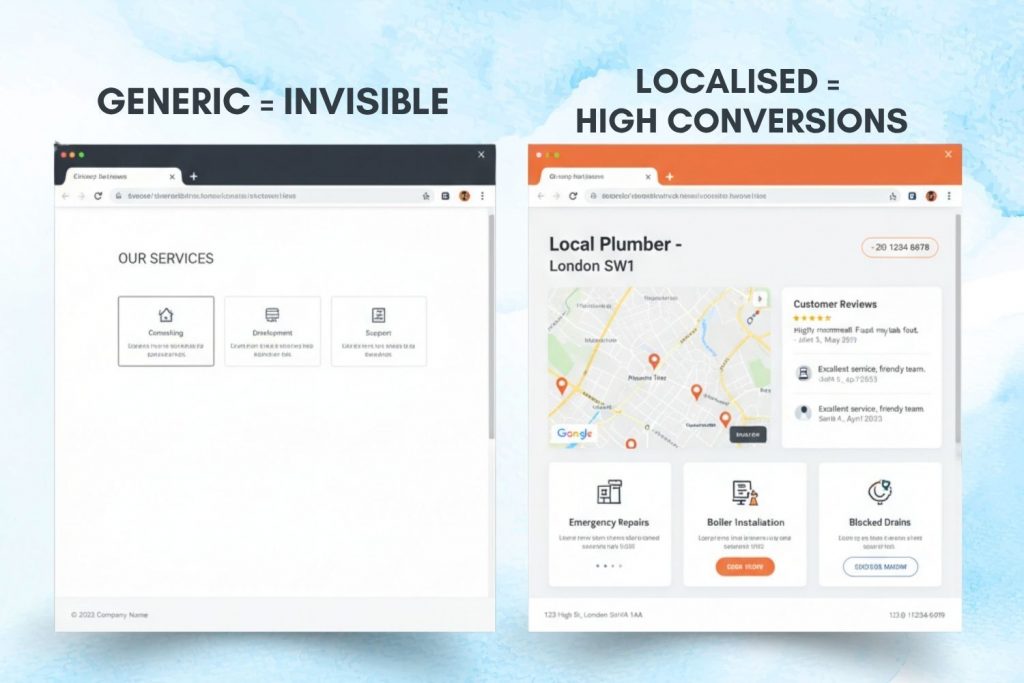
Why Generic Service Pages Fail
Consider these two approaches:
Generic (ineffective): “ABC Plumbing serves homes and businesses across Manchester and surrounding areas. We offer boiler installation, repairs, and maintenance. Contact us today for a free quote.”
Location-specific (high-converting): “Didsbury’s trusted emergency plumber for Victorian terrace homes. We understand the unique heating challenges of period properties in M20 – from outdated pipework to awkward boiler placements in converted flats. 24/7 call-outs, 60-minute arrival, fixed pricing. Servicing Didsbury, West Didsbury, and Withington for 15+ years.”
The second version demonstrates local expertise, addresses neighbourhood-specific concerns, and establishes community credibility. It converts because it resonates.
How to Design Landing Pages for Different Cities/Towns
Unique content is non-negotiable. Google penalises duplicate content across location pages. Never template-swap city names into identical copy.
Structure each page around:
- Hero section with location-specific headline and prominent CTA
- Introduction: Establishing your local presence and experience
- Services with neighbourhood context
- Local differentiators showing community knowledge
- Testimonials from that specific area
- Embedded Google Map centred on the target location
- Local FAQs addressing area-specific questions
- Clear location-specific CTA
A Manchester accountancy firm created dedicated pages for Greater Manchester boroughs, each addressing regional business sectors and local economic contexts. Organic traffic from target locations increased 410% over eight months. Form submissions from location pages converted at 8.3% versus 2.1% for generic pages.
Google Business Profile optimisation amplifies location page performance. Learn the complete strategy in our guide: Google Business Profile Optimisation UK: 5 Proven Steps to Get Found Locally.
Tactic 3: Blog Content That Speaks to Your Community
Generic blog posts (“10 Plumbing Tips for Homeowners”) generate traffic but zero connection. Content marketing strategies for local SEO require community-specific angles that demonstrate you’re from the area, not just working in it.
Event-Driven Content That Captures Local Attention
Local festivals and celebrations provide content opportunities competitors ignore. A Birmingham restaurant publishing “Where to Eat Before the Birmingham Heritage Festival” captures event-related search traffic whilst positioning itself as a community participant.
Local news and trends offer timely relevance. When Manchester announced new clean air zone regulations, smart automotive businesses published guides addressing how it would affect local van owners and businesses.
Industry trends with local context demonstrate sector expertise. A Leeds marketing agency publishing “How Leeds Tech Startups Can Leverage AI Content Marketing” targets a specific audience with timely value.
How-To Guides Tailored for UK Regions
Hyperlocal how-to content addresses location-specific challenges ignored by national publishers.
A Sheffield window installation company published “Replacing Windows in Sheffield Conservation Areas: A Homeowner’s Guide.” It covered planning permission requirements, approved materials for period properties, and costs specific to Sheffield postcodes.
Impact: Ranked #1 for “window replacement Sheffield conservation area.” Generated 67 qualified enquiries over six months. Converted at 24% because leads were pre-educated and specifically interested in conservation-compliant work.
Include Case Study Storytelling for Credibility
Framework: Challenge → Solution → Result
“A Manchester café in the Northern Quarter was struggling with weekday lunch traffic despite strong weekend performance. We implemented a local content marketing strategy targeting office workers within a 10-minute walk radius. Within three months, weekday revenue increased 52%, and they became the default lunch spot for three nearby tech companies.”
This story naturally incorporates location keywords, demonstrates expertise, and provides social proof whilst giving readers a framework they can envision for their own business.
Tactic 4: Event-Based SEO: Capturing Seasonal and Local Trends
Event-based SEO is the strategic creation of content around predictable local events, festivals, and seasonal trends to capture high-intent traffic during peak demand periods.
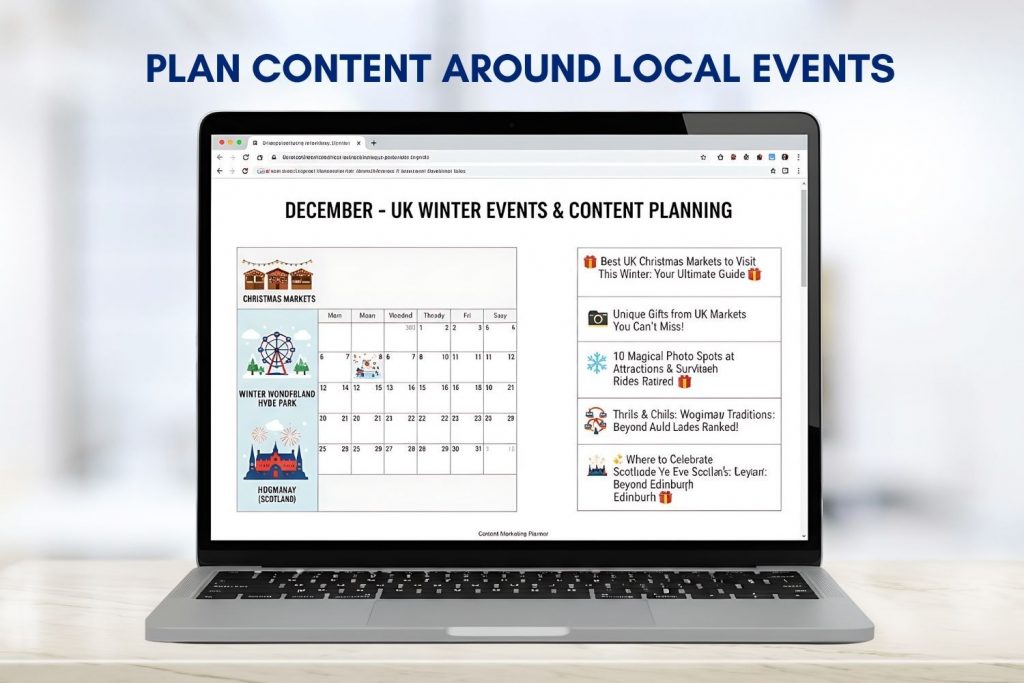
Examples: Wimbledon, Edinburgh Fringe, Manchester Christmas Markets
Wimbledon (June/July) – A South West London catering company creates “Corporate Hospitality Catering for Wimbledon Events” six weeks before the tournament, capturing B2B searches.
Edinburgh Fringe (August) – Edinburgh accommodation providers publish “Where to Stay During Edinburgh Fringe 2025” in May, ranking for hundreds of Fringe-related searches during the festival’s 400,000+ visitor influx.
Manchester Christmas Markets (November/December) – Manchester restaurants and hotels create content capturing millions of annual searches from domestic and international visitors.
How to Optimise Content Calendars Around Local Events
Map your annual event calendar by identifying key seasonal moments: New Year fitness drives, spring home improvements, summer festivals, back-to-school, Christmas markets, and year-end planning.
Create content 6-8 weeks before peak search volume. Google needs time to index, rank, and build authority for event-specific pages.
Update annually rather than starting fresh. A Birmingham hotel updating its “Birmingham Christmas Markets Accommodation Guide” each November benefits from accumulated authority versus creating new pages yearly.
Source: Google Trends reveals real-time search interest for events, allowing you to time content publication for maximum impact.
A Leeds bridal boutique created guides for Yorkshire wedding venues (Harewood House, Bolton Abbey, Rudding Park). “Wedding dress shops near [Venue Name]” searches drove 340+ boutique visits over wedding season. Conversion rate was 31% versus 12% for generic traffic because brides were already venue-committed.
Tactic 5: Leveraging Reviews and User-Generated Content in Local Content
Reviews aren’t just reputation management; they’re powerful content for local SEO that Google crawls, indexes, and uses as ranking signals.
Every five-star review mentioning your services and location is fresh, customer-written content that reinforces your local authority. It’s social proof and SEO fuel simultaneously.
How Reviews Double as Content and Trust Signals
Google reads review text and extracts entity information. When 40 customers mention “emergency boiler repair in Manchester,” Google strengthens its understanding that you’re relevant for those searches.
Reviews answer questions prospects haven’t asked yet. A Sheffield gym with reviews saying “Parking is easy behind the building” and “Showers are always spotless” addresses friction points that website content might miss.
Review velocity signals for business health. Regular new reviews tell Google you’re actively serving customers, not a dormant listing.
Encourage Customer Stories, Q&A, and Testimonials
Systematic review requests generate consistent content flow. A Manchester veterinary clinic emails clients 48 hours post-appointment with a direct review link.
Prompt specific feedback to generate keyword-rich reviews: “Thanks for choosing us for your boiler installation in Didsbury. If you’re happy with the service, a Google review mentioning our boiler work would be incredibly helpful.”
Google Business Profile Q&A lets you seed questions you want answered publicly. A Birmingham solicitor posts: “Do you handle commercial property transactions in Birmingham city centre?” Then answers comprehensively. This content appears prominently on their GBP and ranks for related queries.
Building review ecosystems strengthens your broader local authority. Combine this with our guide on building authority with local backlinks for comprehensive local dominance.
Tactic 6: Case Studies and Success Stories That Build Authority
Case studies are the ultimate E-E-A-T content; they demonstrate real experience, showcase tangible expertise, and build trust through transparent storytelling. For local business content strategy, case studies prove you’ve successfully solved problems for businesses like your reader in locations near your reader.
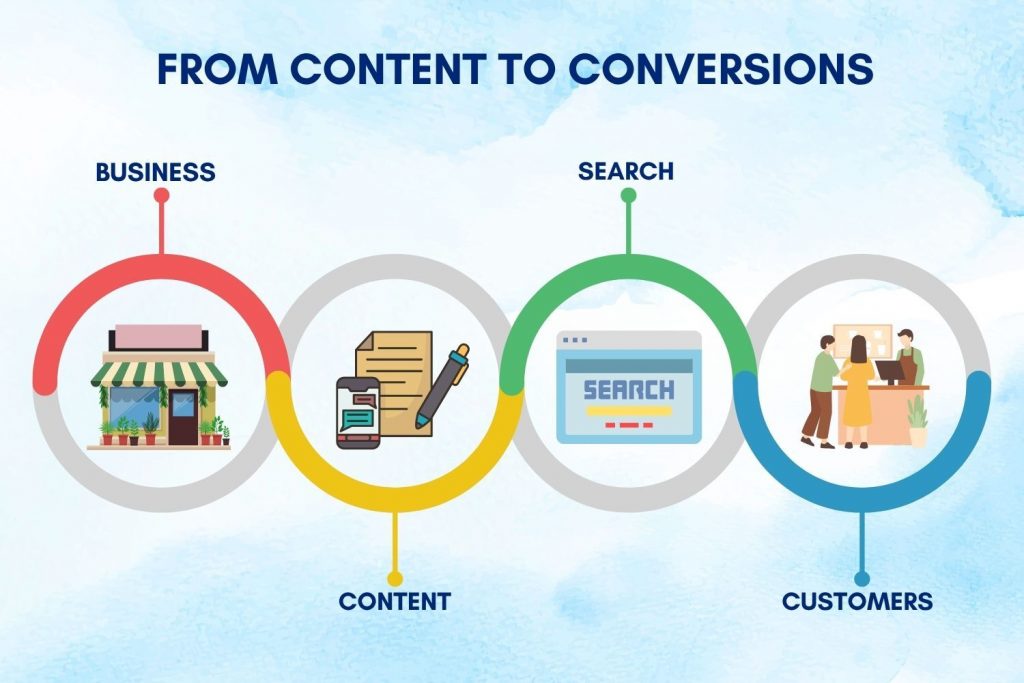
Mini-Case Study: UK SME Improving Traffic Through Location Content
A Bristol marketing agency serving South West England had strong technical SEO but stagnant organic growth. Their content was generic, applicable to any UK city.
Challenge: Competitors in Bristol, Bath, and Exeter dominated local searches despite inferior technical foundations.
Solution: They created dedicated landing pages for each city with unique content, published monthly location-specific blog content, and developed case studies from clients in each location.
Results over nine months: Organic traffic from target locations increased 470%. “Marketing agency [city name]” rankings improved from page 3 to the top 5 for all target cities. Inbound enquiries from location-specific content converted at 9.7% versus 3.2% for generic content.
How Case Studies Create Social Proof and E-E-A-T Signals
Experience: “We’ve done this successfully before” is infinitely more compelling than “we can do this.”
Expertise: Case studies demonstrate methodology, not just outcomes. Walking readers through your strategic thinking positions you as the authority.
Authoritativeness: Being able to showcase client results proves businesses trust you with real budgets and stakes.
Trustworthiness: Transparency about challenges faced and how you overcame them builds credibility. Honest stories feel real.
Tactic 7: Using AI for Smarter Local Content Marketing
AI is the leverage multiplier for small marketing teams, but only when used strategically. The goal isn’t replacing human creativity, it’s amplifying your capacity to produce location-specific content at scale without sacrificing quality.
How AI Helps Scale Content Ideas, FAQs, and Clustering
Idea generation: Prompt AI with: “Generate 50 blog topic ideas for a Birmingham solicitor specialising in employment law, focused on West Midlands business owners.” You’ll get a foundation to refine, not finished content.
FAQ development: “What are the top 20 questions Leeds homeowners ask about loft conversions?” AI generates the question list; your expertise provides authoritative answers.
Content clustering: “Create a content cluster around ‘Manchester property investment’ with one pillar page and 10 supporting subtopics.” AI maps the architecture; you create the substance.
The critical rule: AI generates scaffolding. Humans provide expertise, personality, and genuine local insight.
UK SME Example: AI-Assisted Content Success
A Leeds events venue needed content for 30+ event types across three locations (90 unique pages total). Using AI-assisted templates with human editing, they produced all pages in six weeks at 60% cost savings. Organic traffic for “[Event Type] venue [City]” searches increased 380%, with venue enquiry forms converting at 11.4%.
For businesses exploring AI implementation strategically, our guide on AI tools for local SEO strategies provides frameworks for maintaining quality while scaling output.
Measuring the ROI of Local Content Marketing
Content marketing for local SEO is measurable. If you can’t prove ROI, you either aren’t tracking correctly or your strategy needs refinement.
Key Metrics to Track
Local organic traffic growth: Filter GA4 by landing page URLs to track growth for location pages and geo-targeted content.
Conversion rate by content type: Compare calls, form submissions, and bookings between generic service pages, location landing pages, event content, and blog articles.
Lead source attribution: Ask every enquiry, “How did you find us?” to track which content generates qualified leads.
Local keyword rankings: Monitor “[Service] + [City]” and “[Service] near me” positions monthly. Focus on the top 10 — anything beyond page one generates negligible traffic.
Essential Tools
Google Analytics 4 tracks user acquisition, engagement metrics, conversion completion, and geographic traffic sources.
Google Search Console reveals which queries trigger your content, average positions for geo-specific keywords, and click-through rates.
Google Business Profile Insights shows customer search behaviour, actions taken (clicks, calls, directions), and post performance.
A Manchester SaaS company discovered their Manchester/Leeds content converted 3.2x better than national content. They doubled down on Northern England focus, positioning themselves as “the North’s SaaS solution,” which increased deal velocity and average contract value by 28%.
Common Mistakes UK Businesses Make With Local Content Marketing
Publishing Generic Content Without Geo Signals
“10 Tips for Choosing a Solicitor” could apply anywhere globally. It generates traffic but zero local relevance.
Better: “How to Choose an Employment Solicitor in Manchester: What West Midlands Business Owners Should Know” immediately signals location and relevance.
The test: Remove your city name from the content. If it still makes perfect sense, it’s too generic for local SEO.
Ignoring Location Pages
Service pages saying “We serve the Greater Manchester area” miss opportunities for 20+ dedicated location pages targeting Salford, Stockport, Bolton, and individual Manchester neighbourhoods.
Each location has unique search volume, competitive dynamics, and customer concerns. Treat them individually.
No Clear CTAs (Missing Leads)
Informative content without conversion prompts is digital charity work. Every piece should guide readers toward a clear next step.
Examples:
- “Ready to start your Manchester loft conversion? Request your free design consultation”
- “Book your Birmingham property valuation this week”
- “Download our Leeds Business Tax Planning Checklist for 2025”
Not Updating Content Around Events/Seasonality
Last year’s “Manchester Christmas Markets 2024” guide ranking in November 2025 looks abandoned and damages credibility.
Set calendar reminders to refresh event content annually. A Birmingham hotel updated its 2022 Christmas Markets guide to 2025, and it returned to page 1 within three weeks – recovering an estimated £38,000 in lost bookings.
Ready to Turn Searchers into Customers?
Local content marketing transforms search visibility into revenue. You can optimise technically and build citations, but without strategic, location-specific content speaking directly to your community, you’re invisible where it matters in customers’ minds, ready to buy.
These seven tactics aren’t theory. They’re proven strategies Manchester cafés, Birmingham solicitors, and Leeds agencies use daily to dominate their markets. S Software Ltd partners with UK businesses who refuse to stay invisible, implementing campaigns that generate measurable outcomes: more calls, higher conversions, and predictable growth. The question isn’t whether it works, it’s whether you’ll act while competitors publish generic content nobody cares about.
Take the First Step Towards Content That Converts
Book your free Local Content Strategy Call and discover how location-specific content transforms visibility into revenue. We’ll analyse your current content, identify untapped opportunities, and deliver a prioritised action plan tailored to your market and goals.
No generic advice. No sales pressure. Just strategic insights from a Manchester-based team obsessed with helping UK businesses dominate locally. Book Your Free Strategy Call
Frequently Asked Questions
What type of content works best for local SEO in the UK?
The best content for local SEO in the UK includes location landing pages, event-driven blogs, service area guides, and customer stories with local context. This content signals relevance to Google, builds trust with nearby audiences, and helps businesses appear in the Local Pack and Google Maps.
How do I create local landing pages that rank and convert?
To create effective local landing pages, include geo-specific keywords, clear service descriptions, localised FAQs, and embedded Google Maps. Add testimonials from local customers and a strong call to action. Each page should be unique to the location rather than duplicating content across multiple towns.
Can blogs really improve local search rankings?
Yes. Blogs targeting local keywords, events, and community topics improve rankings by signalling geographic relevance. Consistently publishing high-quality posts also earns backlinks from local media and organisations, helping businesses rank higher in Google’s Local Pack and organic results.
What is event-based SEO, and how does it work?
Event-based SEO involves creating timely, localised content around seasonal or community events, such as Wimbledon or Christmas markets. Optimising blogs or landing pages for these terms captures short-term search spikes, driving targeted traffic and building long-term brand authority in the local area.
How can AI improve my local content strategy?
AI helps by analysing search intent, generating geo-specific content ideas, automating FAQs, and optimising metadata for local queries. When paired with human editing and strategy, AI speeds up content creation while ensuring the output matches UK cultural and geographic context.
Is local content marketing worth it for small UK businesses?
Absolutely. Local content marketing levels the playing field for SMEs by improving visibility in Google Maps, generating qualified leads, and building community trust. Unlike paid ads, optimised local content delivers long-term ROI by continuously attracting nearby customers searching for services.
How do customer reviews affect local content rankings?
Customer reviews act as user-generated content that boosts local SEO. Frequent, high-quality reviews improve trust signals and help Google understand relevance. Including reviews and responses on landing pages and GBP listings can increase click-through rates and ranking potential.
What’s an example of a strong local content strategy in the UK?
A strong UK local content strategy might include service-specific landing pages for each city, event-focused blogs (e.g., “Best cafés near Manchester Christmas Market”), and supplier spotlights. Adding reviews, case studies, and seasonal guides ensures content appeals to both Google and local customers.
How often should I update local content for SEO?
Local content should be updated quarterly at a minimum. Refresh location pages with new photos, updated services, and recent reviews. Blog content should reflect seasonal trends, upcoming events, and changing customer needs to maintain freshness signals that Google prioritises in local rankings.
What’s the difference between local content and national SEO content?
Local content targets specific geographic audiences, using city or neighbourhood modifiers, local case studies, and community events. National SEO content targets broader audiences without geographic intent. For UK SMEs, local content drives foot traffic, calls, and service inquiries — while national SEO focuses on brand reach.

